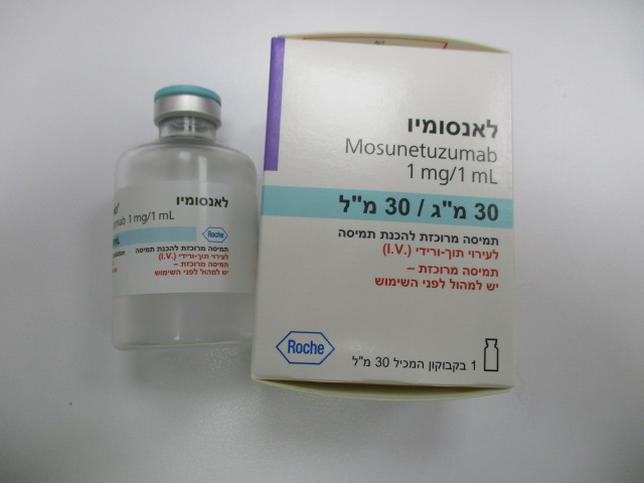Quest for the right Drug

לאנסומיו LUNSUMIO (MOSUNETUZUMAB)
תרופה במרשם
תרופה בסל
נרקוטיקה
ציטוטוקסיקה
צורת מתן:
תוך-ורידי : I.V
צורת מינון:
תרכיז להכנת תמיסה לאינפוזיה : CONCENTRATE FOR SOLUTION FOR INFUSION
עלון לרופא
מינוניםPosology התוויות
Indications תופעות לוואי
Adverse reactions התוויות נגד
Contraindications אינטראקציות
Interactions מינון יתר
Overdose הריון/הנקה
Pregnancy & Lactation אוכלוסיות מיוחדות
Special populations תכונות פרמקולוגיות
Pharmacological properties מידע רוקחי
Pharmaceutical particulars אזהרת שימוש
Special Warning עלון לרופא
Physicians Leaflet
Special Warning : אזהרת שימוש
4.4 Special warnings and precautions for use Traceability In order to improve traceability of biological medicinal products, the trade name and the batch number of the administered product should be clearly recorded. Cytokine Release Syndrome (CRS) CRS, including life-threatening reactions, have occurred in patients receiving Lunsumio (see section 4.8). Signs and symptoms included pyrexia, chills, hypotension, tachycardia, hypoxia, and headache. Infusion related reactions may be clinically indistinguishable from manifestations of CRS. CRS events occurred predominantly in cycle 1 and were mainly associated with Day 1 and Day 15 dose administrations. Patients should be premedicated with corticosteroids, antipyretics and antihistamines at least through cycle 2. Patients must receive adequate hydration prior to the administration of Lunsumio. Patients should be monitored for signs or symptoms of CRS. Patients should be counselled to seek immediate medical attention should signs or symptoms of CRS occur at any time. Physicians should institute treatment with supportive care, tocilizumab and/or corticosteroids as indicated. (see section 4.2). Haemophagocytic lymphohistiocytosis (HLH), including fatal cases, have been reported in patients receiving Lunsumio. HLH is a life-threatening syndrome characterized by fever, hepatomegaly and cytopenias. HLH should be considered when the presentation of CRS is atypical or prolonged. Patients should be monitored for clinical signs and symptoms of HLH (see Section 4.2). For suspected HLH, Lunsumio must be interrupted and treatment for HLH initiated. Serious infections Serious infections such as pneumonia, bacteraemia, and sepsis or septic shock have occurred in patients receiving Lunsumio, some of which were life-threatening or fatal events (see section 4.8). Febrile neutropenia was observed in patients after receiving Lunsumio infusion. Lunsumio should not be administered in the presence of active infections. Caution should be exercised when considering the use of Lunsumio in patients with a history of recurring or chronic infections (e.g., chronic, active Epstein-Barr Virus), with underlying conditions that may predispose to infections or who have had significant prior immunosuppressive treatment. Patients should be administered prophylactic antibacterial, antiviral and/or antifungal medicinal products, as appropriate. Patients should be monitored for signs and symptoms of infection, before and after Lunsumio administration, and treated appropriately. In the event of febrile neutropenia, patients should be evaluated for infection and managed with antibiotics, fluids and other supportive care, according to local guidelines. Immune Effector Cell-Associated Neurotoxicity Syndrome (ICANS) ICANS have occurred in patients receiving Lunsumio, including serious and life threatening reactions. The onset of ICANS can be concurrent with CRS, following resolution of CRS, or in the absence of CRS. Manifestations of ICANS reported in clinical trials included confusional state, lethargy, encephalopathy, depressed level of consciousness, and memory impairment. The majority of cases occurred during Cycle 1. Patients should be monitored for signs and symptoms of ICANS following Lunsumio administration. Patients must be counselled to seek immediate medical attention should signs or symptoms occur at any time. Patients should be advised to exercise caution while (or avoid if symptomatic) driving, cycling or using heavy or potentially dangerous machines (see section 4.7). Tumour flare Tumour flare has been reported in patients treated with Lunsumio (see section 4.8). Manifestations included new or worsening pleural effusions, localised pain and swelling at the sites of lymphoma lesions and tumour inflammation. Consistent with the mechanism of action of Lunsumio, tumour flare is likely due to the influx of T-cells into tumour sites following Lunsumio administration. There are no specific risk factors for tumour flare that have been identified, however, there is a heightened risk of compromise and morbidity due to mass effect secondary to tumour flare in patients with bulky tumours located in close proximity to airways and/or a vital organ. Patients treated with Lunsumio should be monitored and evaluated for tumour flare at critical anatomical sites. Tumour lysis syndrome (TLS) TLS has been reported in patients receiving Lunsumio (see section 4.8). Patients must have adequate hydration prior to the administration of Lunsumio. Patients should be administered prophylactic anti- hyperuricemic therapy (e.g allopurinol, rasburicase), as appropriate. Patients should be monitored for signs or symptoms of TLS, especially patients with high tumour burden or rapidly proliferative tumours, and patients with reduced renal function. Patients should be monitored for blood chemistries and abnormalities should be managed promptly. Immunisation Live and/or live-attenuated vaccines should not be given concurrently with Lunsumio. Studies have not been conducted in patients who recently received live vaccines.
Effects on Driving
4.7 Effects on ability to drive and use machines Lunsumio has major influence on the ability to drive and use machines. Due to the potential for ICANS, patients receiving Lunsumio are at risk of depressed level of consciousness (see section 4.4). Due to the potential for ICANS, patients should be advised to exercise caution while (or avoid if symptomatic) driving, cycling or using heavy or potentially dangerous machines .

שימוש לפי פנקס קופ''ח כללית 1994
לא צוין
תאריך הכללה מקורי בסל
לא צוין
הגבלות
לא צוין
יצרן
GENENTECH INC., USAבעל רישום
ROCHE PHARMACEUTICALS (ISRAEL) LTDרישום
172 15 37418 00
מחיר
0 ₪
מידע נוסף
